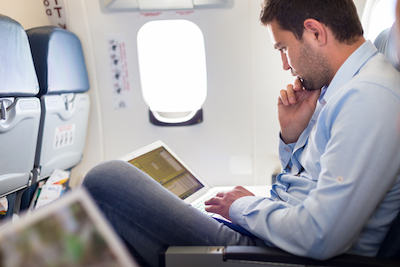
How often do you travel for business? Do you take your laptop to coffee shops? Or out with you to lunch to meet a potential client? Or to another building to do a presentation?
Every time you open it up and start working with your data, you open yourself up to potential problems.
Hackers want nothing more than to collect information that they can use in some manner. They are looking for credit card information to sell, personal information to use, financial information to exploit.
Yet very few of us think about that when we sit down with our favorite drinks in a coffee shop, pop open our laptops, and start typing.
Before you put yourself or your company at risk, putting your personal information or your patient’s records in jeopardy, do these things first.
Use HTTPS
When you bring up a new website, you’ll notice the site comes up with either an HTTP or HTTPS URL. With the HTTPS, you’ll also see a green lock indicating the site is secure. This green lock indicates that the site you are visiting is both sending and receiving information that is encrypted. HTTPS is also a requirement for many new browser features - Chrome will alert you if the site is insecure.
HTTPS helps prevent hackers from tampering with the data transferred between your websites and your user browsers. This includes both hackers with malicious intentions as well as businesses that use the technology to inject ads into your resources. It also increases and protects the privacy and security of your communications. While it may not be the perfect solution, it is the starting point for ensuring every session you use on wifi is more secure.
Turn Off Your Filesharing Option
It’s pretty easy for anyone to set up a network and intercept your data through a “man in the middle” attack. Before you select free wifi, be sure it’s the legitimate one operated through the shop, restaurant, or hotel you are currently in. Further protect your data by turning off your filesharing option in your control panel. Also consider turning on the firewall option while connecting to the public network if not already in use. This provides more protection from hackers coming in and snooping around.
Use a VPN
Creating a Virtual Private Network is the best way to keep your browsing sessions secured. A VPN encrypts traffic between your device and the VPN server, which makes it more difficult for hackers to break in. There are many free and paid options online. Do a little research to find out what best suits your needs.
Forget The Network
When most people are done for the day, they close up their laptops and walk away. But that still leaves your information at risk. When you’re done browsing on public wifi, be sure to log off any services you are signed into. Then tell your device to forget the network. This means your device won’t be able to automatically connect to the network again if you are in range. In the options menu, find “Forget Network” under the network options. As an added precaution, you should also turn on “Ask To Join Networks” in the wifi menu.
Finally, if you have specific personal tasks to perform, such as banking or investing, save it for when you’re able to connect with your cellular service or a secure network. Even in most public places, your phone remains within your personal mobile service, which gives it the added level of security.
For IT Strategy, Cloud Conversion, or Help Desk Services reach out to us at Silver Linings Technology 360-450-4759.


